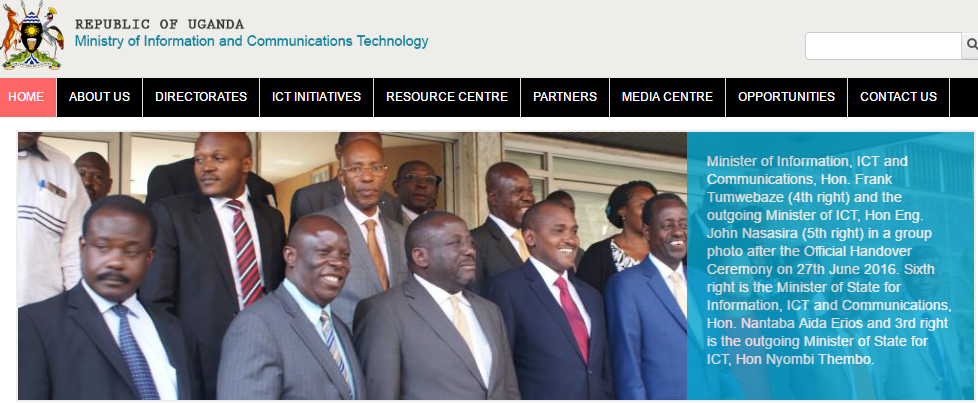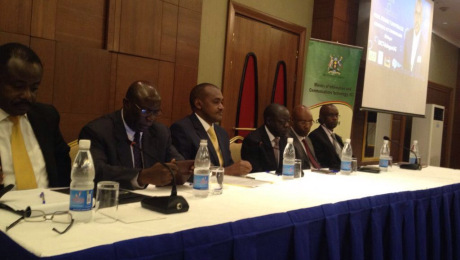On July 7th, Uganda’s newly formed Ministry of Information and Communications Technology held its “maiden stakeholder dialogue”, that was live tweeted with hashtag #ICTDialogueUg. Invited to this dialogue, according to the Minister, Hon. Frank Tumwebaze, were media practitioners and ICT stakeholders.
@Sheraton @9AM; Media practioners and ICT star holders
— Frank K Tumwebaze,MP : Psalms 124 : 1-8 (@FrankTumwebazek) July 6, 2016
Among these stakeholders present were some men, more men and other men.
Communications and ICT Ministry @MoICT_Ug hosting industry stakeholders for a dialogue this morning. #ICTdialogueUG pic.twitter.com/rK8tTKy9jw
— Albert MUCUNGUZI (@albertmuc) July 7, 2016
The existence of an all-male panel [hence man-el] at such a meeting is worrying. At all meetings, but for this dialogue, one would hope that the Ministry of ICT would take lead in involving all parties in activities involving information exchange.
The mandate of this new ministry, created in line with the National Development Plan 2015-2020 is: “To provide strategic and technical leadership, overall coordination, support and advocacy on all matters of policy, laws, regulations and strategy for the ICT Sector for sustainable, effective and efficient development, as well as harnessing and utilization of ICT in all spheres of life to enable the country achieve its development goals.”
All of those words mean nothing without the involvement of ALL the people- especially youth and women, who continue to be invisible and silent in development.

Screenshot from the ICT Ministry official website (as of July 7th, 2016)- Notice the gender of those pictured
Invisibility and silence that continues to exist because we don’t care enough. We are too lazy and too content with the little male gatherings to see the problem. For even with this dialogue, the number of women who could have been great on the panel is innumerable. Media practitioners have women (New Vision and NTV both have women at the top, and Radio One is owned by a woman ). Even more importantly, Uganda has several women who are at the top of their game in ICT. At the last World Economic Forum in May, three out of ten African women recognized for digital innovation were Ugandan. These women are actively involved in the ICT scene of this country, many have written on the impact of regulations on information sharing and have great thoughts on where we should go.
Uganda has been lauded for its inclusion of women in top leadership. We are not Rwanda, but with the 1995 Constitution have made deliberate efforts to include women. The Ministry top leadership includes a woman, Aidah Nantaba, who is the State Minister. Apparently she was unavailable for this meeting.
.@Women4WomenUG She is attending another high level meeting as earlier communicated. Thnx for the inquiry #ICTdialogueUG
— Ministry of ICT&NG (@MoICT_Ug) July 7, 2016
It appears like they only just ticked boxes.
Step 1: Put a woman in leadership.
Step 2: Make policy provisions for women and youth. Make sure you keep calling them “stakeholders”.
.@Women4WomenUG currently all our policies have provisions for Women & Youth as key stakeholer groups #ICTdialogueUG
— Ministry of ICT&NG (@MoICT_Ug) July 7, 2016
Now here is the difficult step that everyone forgets: Involve them in the decision making processes.
ICT is especially important because if the information cannot get to a group, they are already disadvantaged. And when it comes to women, there are serious gender gaps. Reports show that nearly 25 percent fewer women than men have access to the Internet in the developing world, and in regions like sub-Saharan Africa, that gap goes up to nearly 45 percent.
Between literacy (Uganda has 100% enrollment ratio at primary level for girls, but high dropouts at higher levels of education) and high cost of ICT, gender inclusion is essential to the achievement of the mandate of the ministry.
And while the Ministry was kind enough to make policy provisions, they forgot to invite women and youth to the table. This table is important because this is where who makes the decisions is seating, and from the looks of it, whoever is making the decisions is a Ugandan male above 30 years.
''Internet is no longer a luxury.It is a basic need&should be affordable''@FrankTumwebazek #ICTdialogueUG @NWSCMD pic.twitter.com/z2P6IdUiax
— NWSC 😷🇺🇬 (@nwscug) July 7, 2016
As for the stakeholders who were invited, there were more men in the room. One looking at this room would be hard pressed to believe that women make up 51% of the population in this country.
#ICTDialogueUG in pictures at Sheraton Hotel with @FrankTumwebazek pic.twitter.com/FlK1y1H56E
— Sarah Kyobe N. (@kyobesarah) July 7, 2016
Lt. Col. Paddy Ankunda in attendence as well. #ICTdialogueUG pic.twitter.com/bh0GiVNhZP
— YoDime (@YoDimeUg) July 7, 2016
I must say the #ICTdialogueUG has drawn quite the crowd and the conversations here are frank and candid. pic.twitter.com/IS8poov2WL
— Cynthia Nyamai (@CynthiaNyamai) July 7, 2016
By Rebecca Rwakabukoza from Uganda.



